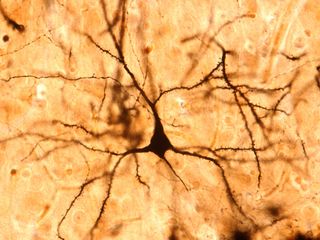A new study suggests that human neurons may have more computing power than once thought.
The following written content by Nicoletta Lanese

Cells nestled in the outermost layers of the human brain generate a special kind of electrical signal that might grant them an extra boost of computing power, new research suggests. What’s more, this signal may be unique to humans — and may explain our unique intelligence, according to the study authors.
Brain cells, or neurons, link up through long, branching wires and shuttle messages along these cables to communicate with each other. Each neuron has both an outgoing wire, called an axon, and a wire that receives incoming messages, known as a dendrite. The dendrite passes on information to the rest of the neuron through bursts of electrical activity. Depending on how the brain is wired up, each dendrite may receive hundreds of thousands of signals from other neurons along its length. While scientists believe these electrical spikes help wire the brain and may underlie abilities like learning and memory, the exact role of dendrites in human cognition remains a mystery.
Now, researchers have uncovered a new flavor of electrical spike in human dendrites — one they think might allow the cells to perform computations once thought too complex for a single neuron to tackle on its own. The study, published Jan. 3 in the journal Science, notes that the newfound electrical property has never been observed in any animal tissue other than human, raising the question of whether the signal uniquely contributes to human intelligence, or to that of primates, our evolutionary cousins.
A strange signal
Up until now, most dendrite studies have been carried out in rodent tissue, which shares basic properties with human brain cells, said study co-author Matthew Larkum, a professor in the department of biology at Humboldt University in Berlin. However, human neurons measure about twice as long as those found in a mouse, he said.
“That means the electrical signals have to travel twice as far,” Larkum told Live Science. “If there was no change in the electrical properties [between rodents and people], then that would mean that, in the humans, the same synaptic inputs would be quite a bit less powerful.” In other words, electrical spikes received by a dendrite would weaken significantly by the time they reached the cell body of the neuron.
So Larkum and his colleagues set out to uncover the electrical properties of human neurons to see how these longer dendrites actually manage to send signals effectively.
This was no easy task. Read more from Live Science.





